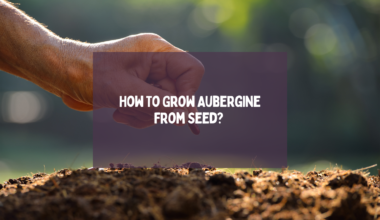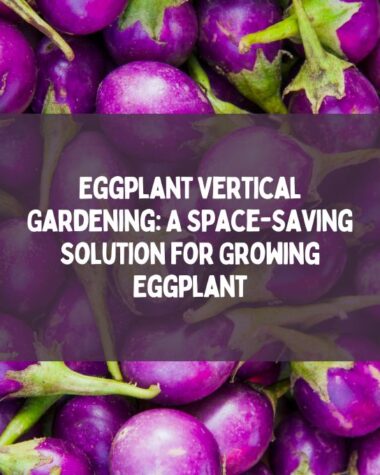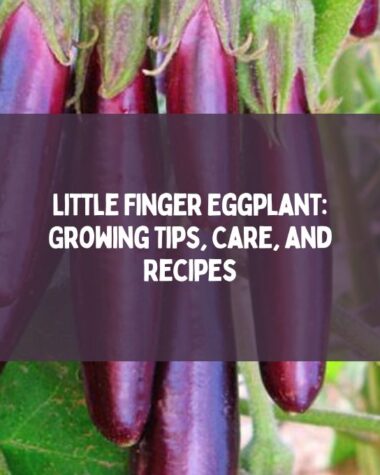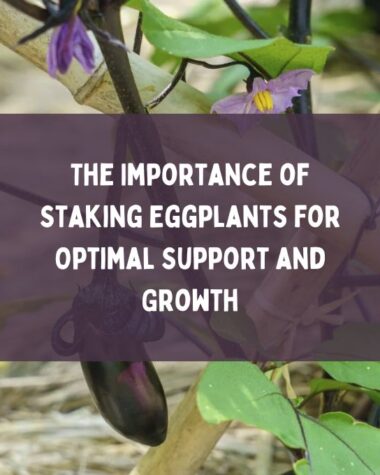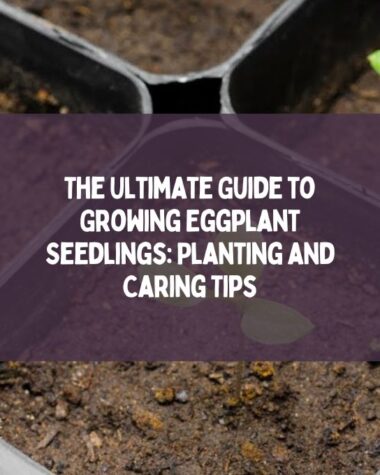There are many potential eggplant growing problems when it comes to growing eggplants. From finding the right soil conditions and sunlight to dealing with pests and diseases that may occur during the growing process. As well as solutions for how to resolve them.
Eggplant is a popular vegetable to grow in gardens and allotments. But, like any other plant, they can have trouble growing, which can stop them from doing well. In this article, I’ll discuss the top 5 eggplant growing problems.
Read on to learn more about eggplant growing problems and their solutions!
1. Poor Soil Quality
The quality of the soil in your eggplant bed is critical to your plant’s success. Signs of poor soil quality include slow growth, yellowing leaves, and stunted fruit production. Poor soil quality is caused by a lack of organic matter, nutrient deficiencies, and pH imbalances.
Here is the solution to the Poor Soil quality problem.
- Test the Soil Quality: To improve the quality of your soil, start by testing it for nutrient content and pH level. You can do this using a soil testing kit or by sending a soil sample to a lab for analysis. Once you know what your soil is lacking, you can amend it with organic matter. The structure and fertility of the soil can be improved with compost or aged manure. Adding amendments like lime or sulfur can also help adjust the pH level of the soil if necessary.
- Use Mulch: In addition to improving the soil quality, use a mulch around your plants. It helps retain moisture in the soil and suppress weeds. Applying a layer of mulch made of organic material like straw or leaves will also provide a slow release of nutrients to your plants.
2. Inadequate Watering
Eggplant plants need consistent moisture to thrive. But overwatering or underwatering can cause eggplant growing problems. Signs of under-watered or over-watered eggplant plants include wilting, leaves turning brown and wilt, and root rot.
Factors that contribute to inadequate watering include improper irrigation, inconsistent watering, and poorly draining soil.
There are several ways to address this issue and ensure that your plants receive the right amount of water. Here are some solutions to inadequate watering.
- Check Moisture Level: Regularly To provide your eggplant plants with the right amount of moisture, finger the soil. The soil should be watered if it feels dry to the touch. You need to check the moisture level of the soil regularly using a moisture meter.
- Water Deeply and Infrequently: When you water your eggplant plants, be sure to do so deeply and infrequently, rather than shallowly and frequently. In this way, the roots will be able to grow deeper into the soil. And it also helps the plant develop a stronger root system.
- Use Drip Irrigation System or Soaker Hose: Using a drip irrigation system or soaker hose is a great way to provide consistent, even moisture to your plants. These systems deliver water directly to the roots of the plants, reducing the risk of overwatering or underwatering.
Related Reading:
- How to Grow Delicious Aubergines in Your Polytunnel?
- The Ultimate Guide to Growing Eggplant Seedlings: Planting and Caring Tips
- How To Grow Eggplants In Containers – Aubergine Container Gardening
3. Pest Infestations
Eggplants plants can be susceptible to a variety of pests, including aphids, whiteflies, spider mites, and flea beetles. Signs of pest infestations include the leaf veins turning brown, distorted growth, and visible pests on the plant.
There are several solutions to prevent pest infestations in your garden. Check out these natural and chemical pesticides to tackle pest infestations.
- Identify the Pest: The first step in controlling a pest infestation is to identify the type of pest that is affecting your aubergine or eggplant plants. This will help you determine the most effective control method.
- Remove Affected Plant Parts: If you notice pests on your plants, remove any affected plant parts, such as leaves or fruit, to prevent the infestation from spreading.
- Use Insecticidal Soap or Oil Insecticidal soap: Oil is an effective method for controlling pest infestations on your eggplant plants. These products work by suffocating and drying out the pests. It is applied using a spray bottle or garden sprayer.
- Introduce Beneficial Insects: Introducing beneficial insects, like ladybugs and lacewings.. which help control pest populations on your eggplant plants. These insects prey on pests like aphids and whiteflies, reducing their numbers and preventing further damage to your plants.
4. Temperature Extremes
Eggplant plants are sensitive to temperature extremes and can suffer from heat stress or cold damage. Signs of temperature stress include wilting, and stunted growth.
Temperature extremes, whether hot or cold, can stress and damage plants, affecting their growth and productivity. There are several strategies you can implement to mitigate temperature extremes in your garden.
- Choose the Right Variety: When selecting a variety of eggplant to grow, choose one that is well-suited to your climate. Some varieties are more heat-tolerant, while others can handle cooler temperatures.
- Provide Shade or Cover: If your plants are experiencing heat stress, provide shade or cover to protect them from direct sunlight. You can use a shade cloth or row cover to provide shade or move your plants to a shadier location.
- Use Frost Protection: If your plants are at risk of cold damage, use frost protection measures such as covering them with blankets or tarps to protect them from freezing temperatures.
5. Poor Plant Care
Poor plant care can also contribute to eggplant growing problems. This includes factors like over-fertilization, improper pruning, and lack of support for the plants.
Proper plant care is essential for your garden’s health and success. Poor plant care leads to stunted growth, diseases, and pests. You can improve plant care and promote optimal growth and health by implementing a few simple solutions.
- Follow Fertilization Guidelines: To avoid over-fertilizing your eggplant plants, follow the guidelines on the fertilizer package. And only apply as much fertilizer as recommended. Applying too much fertilizer can cause the plants to produce excessive foliage at the expense of fruit production.
- Prune Your Plants: Proper pruning help your eggplant plants grow more vigorously and produce larger fruit. Remove any dead or diseased plant parts, and prune away any unnecessary foliage to allow more sunlight and air circulation to reach the fruit.
- Provide Support: Eggplant plants become top-heavy as they grow, and may require support to prevent them from bending or breaking. Use stakes, cages, or trellises to provide support for your plants as they grow.
Read More
- 10 Tomato Seedling Problems and How to Protect Them?
- What Causes Holes In Cucumbers And How to Prevent It?
- Troubleshooting Carrot Growing Problems: Why Won’t My Carrots Develop?
Conclusion
Growing eggplants can be a rewarding and enjoyable experience, but it’s important to be aware of the common aubergines growing problems that can arise and how to solve them.
By taking steps to improve soil quality, provide adequate water and sunlight, control pests, and provide proper care, you can help ensure the success of your eggplant plants.
With a little bit of effort and attention, you’ll be able to harvest delicious and healthy eggplants from your garden for years to come.
